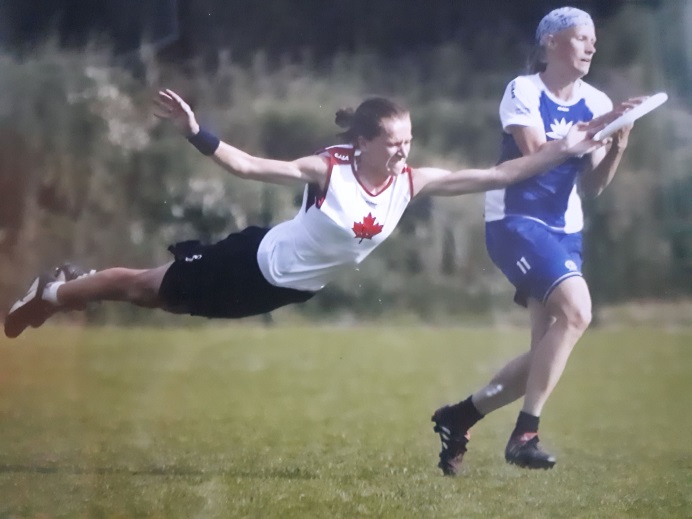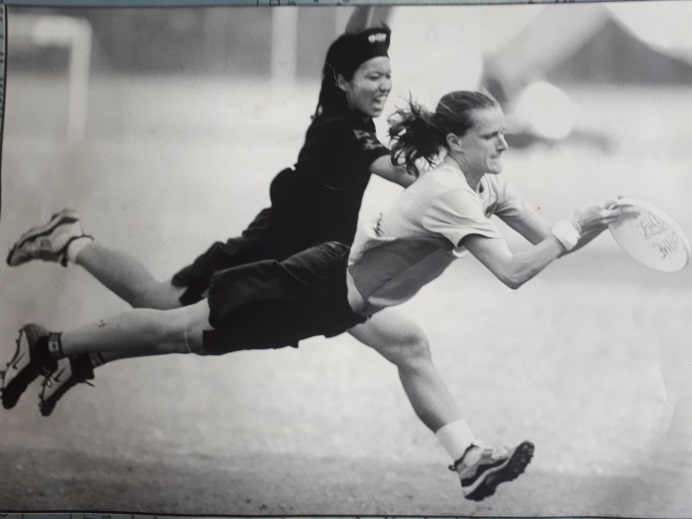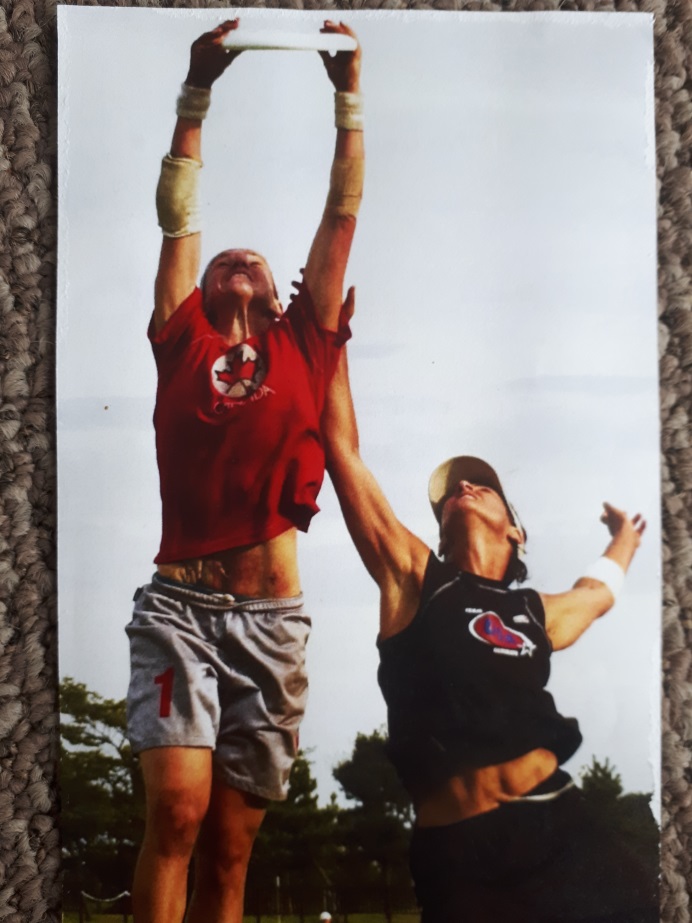Class of 2017
Leslie Calder
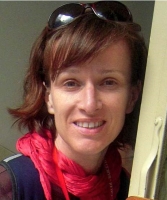
Leslie Calder
Hometown: Vancouver, BC, Canada
Born: 1970 (Age 55)
Career Information
National Team
World Championships
3x World Champion (2000, 2001, 2004)
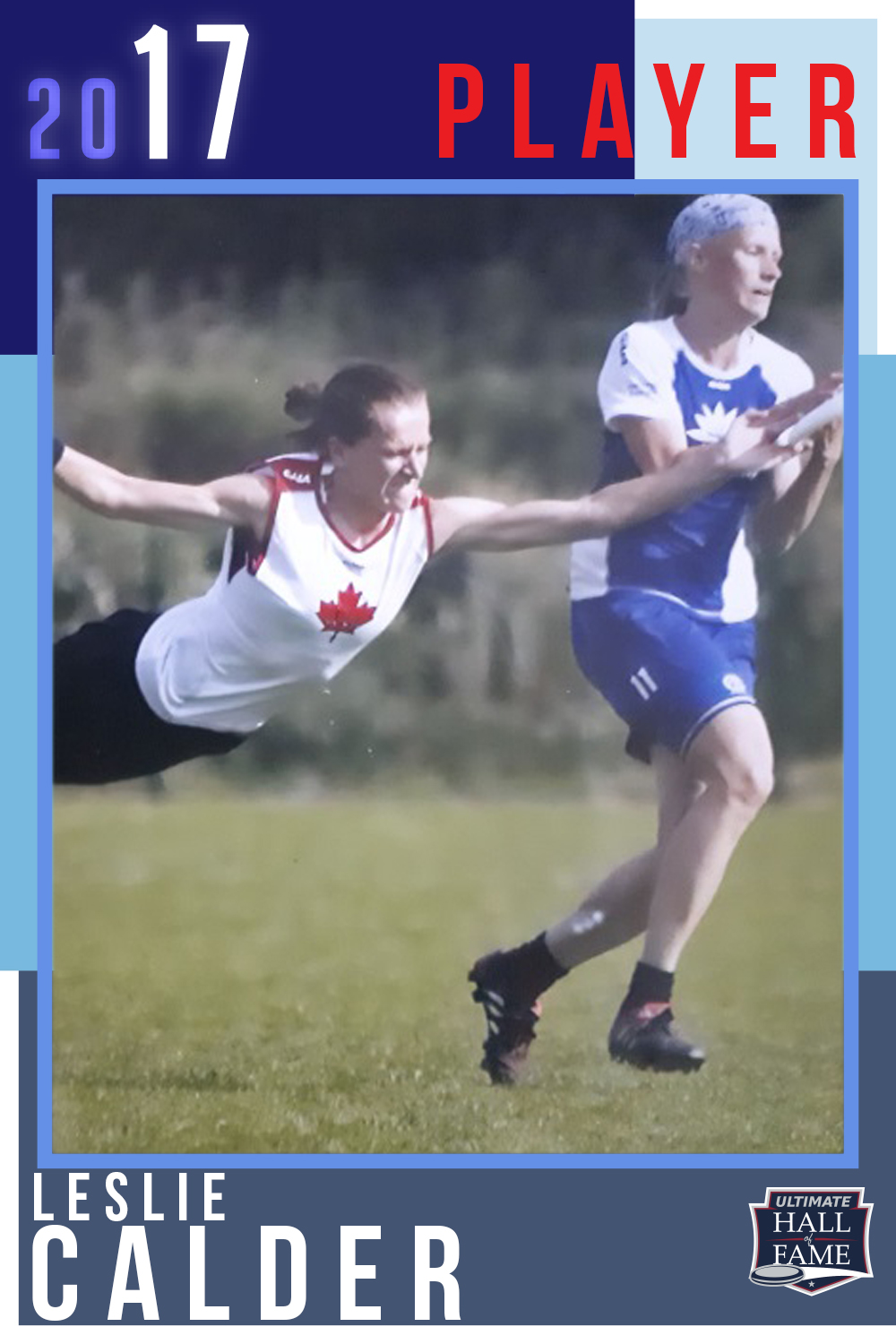
Leslie Calder grew up in a very athletic family that focused on badminton; both parents and two older sisters have Canadian national titles. After obtaining Western National titles at 15 and attending McGill University to pursue badminton, the ultimate world benefited from Leslie’s discovery of it via college intramurals.
Described as a legend and a game-changer by her opponents and astute ultimate players from the women’s and open divisions, Leslie was a physical, driven competitor who trained hard, put her team first, and played every point full-out. She was an all-around player who was equally devastating on offense and defense. Teams had to adjust their offensive and defensive plans to try to contain her, and she always rose to the challenge of the top match-ups. Her combination of great top speed, jaw-dropping explosiveness, tremendous disc skills, unflappable mental toughness and enviable field vision was unparalleled. As a sign of her contributions to the sport, this talented lefty is already in the Canadian Ultimate Hall of Fame.
Leslie was all substance and no drama; she played and led her teams with tremendous integrity. She always demonstrated respect for opponents and never let her emotions get the best of her; she let her impressive play do the talking.
Contributions & Service
- 1996-2005: Vancouver Ultimate League Clinics Volunteer
- 1997, 1998, 2000: Goo & Prime Coach/Co-Captain
- 2003-2004: University of British Columbia's Women's Ultimate Team Coach
- 2005: Vancouver Hussey Coach
- 2007: Vancouver Ultimate League Team Mentor
- 2007-2008: Team Canada Women's Ultimate Team Coach
Championship Tournaments
U.S. National Championships
| Year | Team | Placement |
|---|---|---|
| 0 | GOO Club Women | 1st |
| 0 | GOO Club Women | 1st |
| 0 | GOO Club Women | 1st |
| 0 | GOO Club Women | 1st |
| 0 | GOO Club Women | 2nd |
| 0 | Prime Club Women | 1st |
| 0 | Prime Club Women | Semifinals |
| 0 | Prime Club Women | 1st |
| 0 | Prime Club Women | 2nd |
| 0 | Prime Club Women | Regionals |
| 0 | Traffic Club Women | 1st |
| 0 | Traffic Club Women | Regionals |
World Championships
| Year | Tournament | Team | Placement |
|---|---|---|---|
| 1996 | WUGC Jonkoping, Sweden | Team Canada Club Women | 5th |
| 1997 | WUCC Vancouver, BC, Canada | GOO Club Women | 9th |
| 1998 | WUGC Blaine, MN | Team Canada Club Women | 3rd |
| 2000 | WUGC Heilbronn, Germany | Team Canada Club Women | 1st |
| 2001 | World Games Akita, Japan | Team Canada Club Women | 1st |
| 2004 | WUGC Turku, Finland | Team Canada Club Women | 1st |
Interview
What position(s) (e.g., handler, deep cutter, middle middle) did you usually play?
• Lane cutter
• Defender
Please describe your major accomplishments - both as a teammate and individual?
• Being a team member and co-captain of Prime/Team Canada in 2000 when we led the team to our first World Championships in Germany, won Northwest Women’s Regionals in California, and placed third/fourth at the UPA Championships in Florida. Note: Prime/Team Canada was self-coached.
• Being a team member and co-captain of Team Canada in 2001 when we won the first-ever gold medal in Flying Disc at the 2001 World Games.
• Being a team member of Legion of Doom, the first Canadian team to ever win Potlatch (1998).
• Being a team member of Prime/Team Canada in 2004 when we repeated as World Champions in Finland and were a finalist of the UPA Championships in Florida. We were still self-coached.
• Being a team member of Goo in 1994 when we won our first Canadian national championship. Everyone in my family had a national title except me up until this point, so it was a personal milestone to live up to the family standard.
• Winning seven Canadian national women’s championship titles with the Vancouver women’s teams. Being named MVP twice (’95 & ’96?) in the Canadian national finals.
Please explain why you stood out among the elite players of your time. What was it that you did best, or were known for?
I believe I was respected for my athleticism, sports intelligence, mental toughness and all-around play. With regards to athleticism, one of my teammates stated that I “legitimized ultimate as a sport in Vancouver” by the commitment and drive that I brought to the game. Coming from an athletic family and playing and training at an elite level in badminton as a junior, I had a strong work ethic to train in the off-season and outside of practice. This enabled me to get the most out of practices and be able to play at a high level from the start of a tournament until the last point of our last game. Often I was called “fast,” but I also think it was my ability to read/anticipate plays (thanks to taking every opportunity to study the game), fitness and field sense that enabled me to utilize what speed I had. With regards to sports intelligence, I was part of the leadership of Goo/Prime that introduced an alternate non-zone offense to the stack offense: a flood offense. I worked with the leaders of Furious George to understand their offense, and our leadership modified it to fit the strengths of our team at the time – height, intelligence and athleticism. I believe we were one of the first women’s teams to play a non-zone, non-stack offense, starting in 1998. We were also the first women’s team, starting in 2000, to play a horizontal offense. We then switched between the three offenses based on who we were playing against and field conditions.
With regards to mental toughness, I introduced it formally to our team in 2000. The majority of our team had stayed together since 1997 and had strong skills and fitness, but we had great difficulty beating U.S. teams in the big games and so had never been to the UPA Championships. Since I knew our team had the talent to beat the U.S. and Japanese, in the off-season prior to the 2000 season, I designed four 20-30-minute talks on mental toughness and delivered them to the team over a series of four weeks. Due to this and other factors, we went on that year to win our first-ever world championship title, and we qualified for our first-ever UPA Championship by winning Northwest Regionals and securing the first seed in Florida.
With regards to being an all-around player, at my peak, I was equally as strong on shut-down person defense against the top handlers and lane-cutters as I was both as a deep, mid-mid or cupper on zone D, and I was a double threat as a lane cutter who could either come under and throw any throw with accuracy or strike deep with speed that enabled me to play in the open division. With respect to my defensive capabilities, in the fall series of 2000, Schwa, one of our main competitors, modified their offense to remove whomever I was covering from contributing to the offensive play. Also, in preparation for the World Games in 2001, I played with a Vancouver-San Francisco-Houston pick-up elite open team in Flowerbowl 2001, and I contributed to the team winning the tournament and beating Sockeye in the finals.
What role did you play on the best (or most overachieving team) that you played on?
• Lane cutter, play caller, strategist and co-captain of Prime/Team Canada in 2000.
• Lane cutter on Team Canada, co-captain during World Games 2001.
• Lane cutter on Team Canada in 2004, and all coed teams at Potlatch.
What year was the peak of your career? During which years were you playing as the "stud" of your team? If you continued playing after your peak years, how did your role change? In what year did you stop playing at the top competitive level?
In women’s, I played my best as an “all-around player” in 2000, my last full season of women’s ultimate. I came back in 2002 for six weeks in the fall to help the team, which was experiencing growing pains during a re-building year, and I believe I was able to maintain my level of play after not playing for a year. In 2002, the team placed 17th at the World Ultimate Club Championships. When I joined the team for the fall, as a re-focused team, we went on to win Labour Day in which we beat Fury and Rare Air, and sectionals in which we beat Riot. We then lost two games to go, to Fury and Schwa, at regionals. After my dad passed away, I returned again in the summer of 2004. With the team switching to an O-line/D-line structure, my role changed to that of more of an offensive contributor. I believe my offensive skills improved versus 2000/2002, but my focus and defensive skills declined in part due to multiple injuries and an aging body that didn’t match up to my mind’s demands. That year, I also played an advisory role to the captaining group to help them prepare for the World Championships. I played again in the fall of 2006 with Prime and 2007 with Traffic as an O-line member, when the team asked me to help out. I was honoured to be a part of the team, but my training and play was again limited by injuries.
In mixed, I peaked in 2001 with the 2001 World Games and was able to maintain that high level of play into 2005 when playing with the Vagabonds at Potlatch where we beat the U.S. National Team in the semifinals.
Have the candidate served in an official capacity as an officer, committee member, coordinator, or volunteer for USA Ultimate/UPA or other recognized ultimate or disc sports organization, or as a coach of a team? Describe role and dates served.
• Coach of Team Canada Women’s Ultimate Team, November 2007 – August 2008.
• Coach of the University of British Columbia’s Women’s Ultimate Team, October 2003 – May 2004.
• Coach of Vancouver Hussey, Feburary 2005 – August 2005.
• Team Mentor, Vancouver Ultimate League, Summer 2007
• Volunteer, Vancouver Ultimate League Clinics 1996-2005
• Coach/Co-Captain Goo/Prime 1997, 1998, 2000
Why do you believe you are worthy of being inducted into the Ultimate Hall of Fame?
A few former captains of Furious George stated they felt I was the most dominant player of my time across both genders. That comment still makes me pause, as most of them were my role models and players I learned so much from. I feel when I was at my best, I was able to play shut-down defense on both top handlers and cutters, and I was able to get open against the top defenders. I even felt comfortable playing as a contributing team member in the open division of Flowerbowl, where my team won the division by beating Sockeye in 2001. It was also an honour to play on northwest pick-up teams, which won Tempe NYF several times. I am so grateful for the competition I got to play against in women’s, mixed, open, practice and league, and I had a mindset of :the harder, the better.” I used every opportunity I could to grow my game and finish each practice or match knowing I had contributed the best I could to my team and the sport I love.
